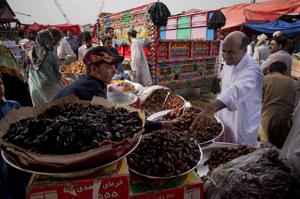
The next week holds holy days for many religions.
Probably best known is the beginning of Ramadan, the Islamic month of fasting, which begins at sunset March 22.
The annual fast is one of the Five Pillars or practices required in Muslim life.
During this time, Muslims refrain from food, drink, sexual activity, smoking or other sensual practices during daylight. They should not raise their voices in anger while fasting.
Fasting is required of everyone past puberty who is mentally and physically capable. Children are encouraged to fast as much as possible. Persons who are ill or traveling may postpone their fast.
In the evening, a light meal, the iftar, is eaten. The iftar is usually dates and water or juice, but any lawful food may be used. The Maghrib salah, the after-sunset prayer, follows. A complete meal is then eaten, followed by a brief rest. Then Muslims go to the mosque and offer the ‘Isha salah, the night prayer, and a special night prayer called taraweeh. Another light meal is eaten before daybreak.
Spring O-Higan/March 20
Buddhism
A holiday for Japanese Buddhist sects, the word means other shore, and is celebrated on the equinoxes and the days before and after. It is thought that the living and the dead are closest to each other on those days.
It is a time for reflection and for remembering and honoring the dead. Gravesites are cleaned, and other items are offered for the deceased, such as flowers, incense, food and rituals.
Buddhists honor the six paramitas of generosity, morality, patience, endeavor, meditation and wisdom on these days.
Shunbun no Hi/March 20
Shinto
Just as Buddhists celebrate the equinox in Japan, so do the members of Shinto. I t is mainly a secular holiday now and is marked by a national day off. People spend time with family, visit zoos and parks, or other outdoor activities. Many follow traditions of cleaning graves.

Leave a Reply